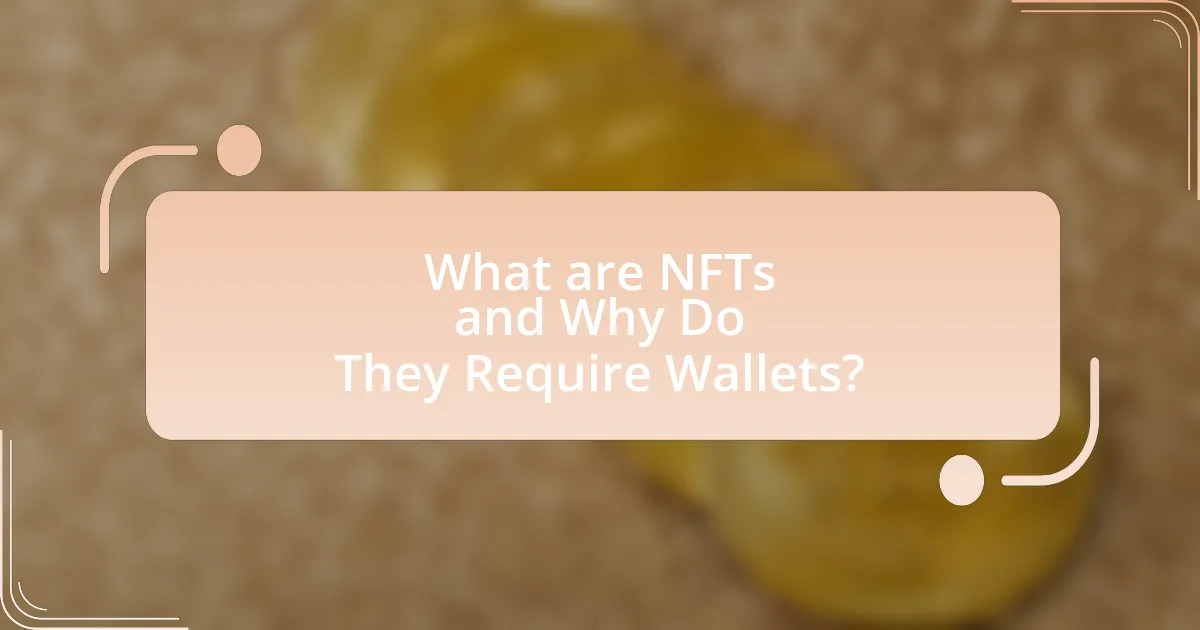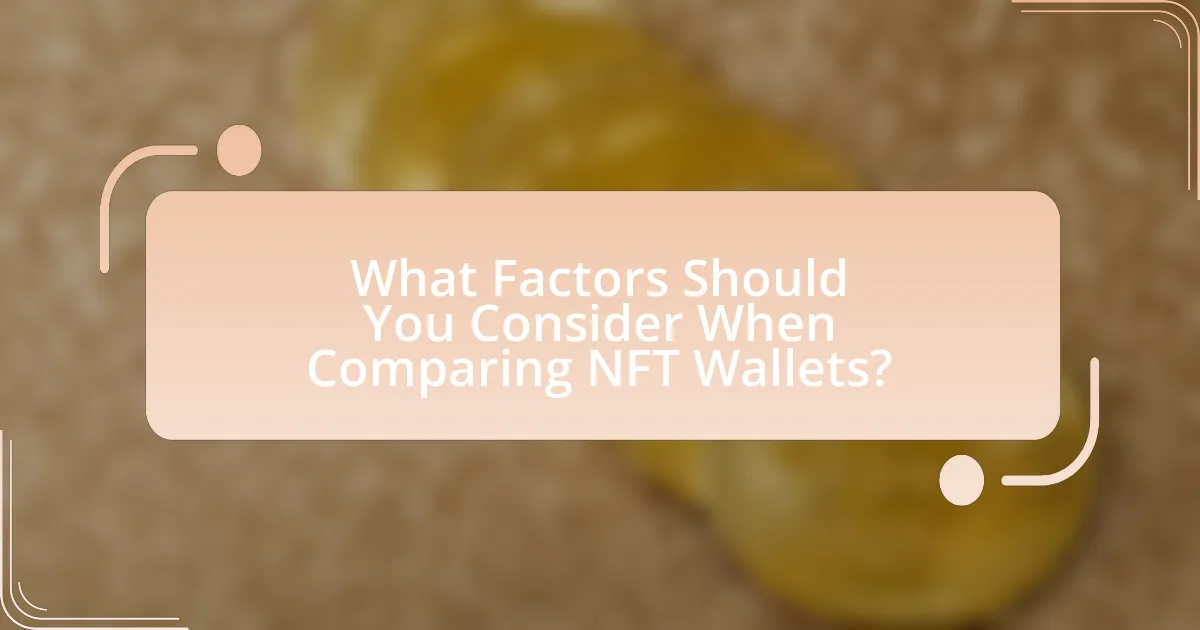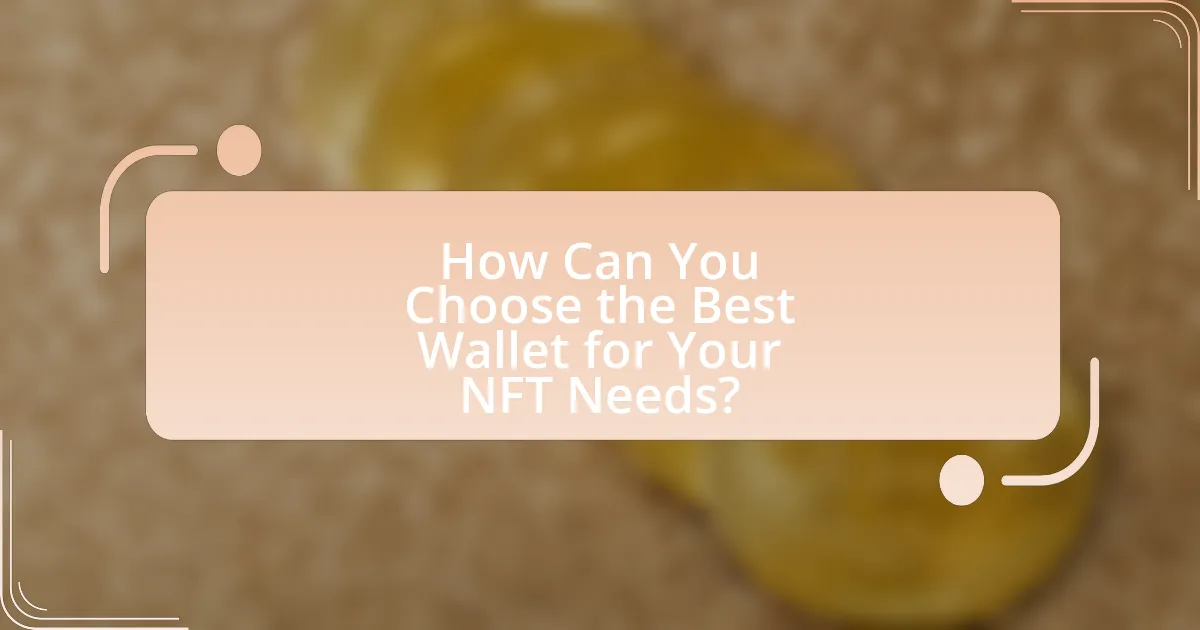The article focuses on comparing wallets for Non-Fungible Tokens (NFTs), emphasizing the importance of secure storage and management of these unique digital assets. It outlines the distinct characteristics of NFTs, such as their uniqueness and ownership verification through blockchain technology, and explains the critical role wallets play in facilitating transactions and safeguarding assets. Key considerations for selecting an NFT wallet include security features, compatibility with various marketplaces, user experience, and the types of wallets available, such as custodial, non-custodial, hot, and cold wallets. The article also highlights best practices for managing NFTs and ensuring their security, providing readers with essential insights for effective NFT management.

What are NFTs and Why Do They Require Wallets?
NFTs, or Non-Fungible Tokens, are unique digital assets that represent ownership of a specific item or piece of content on a blockchain, typically Ethereum. They require wallets because these wallets store the private keys necessary to access and manage the NFTs, ensuring secure transactions and ownership verification. Each NFT is distinct and cannot be exchanged on a one-to-one basis like cryptocurrencies, making the secure storage and management of these assets critical for their owners.
How do NFTs differ from traditional assets?
NFTs differ from traditional assets primarily in their digital nature and uniqueness. Traditional assets, such as stocks or real estate, are typically fungible, meaning they can be exchanged on a one-to-one basis without loss of value. In contrast, NFTs are non-fungible tokens that represent ownership of a specific digital item or piece of content, making each token unique and not interchangeable with others. This uniqueness is secured through blockchain technology, which provides a verifiable proof of ownership and provenance. For example, a digital artwork sold as an NFT cannot be replicated in the same way a physical painting can, as each NFT has distinct metadata that differentiates it from other tokens.
What unique characteristics define NFTs?
NFTs, or Non-Fungible Tokens, are defined by their uniqueness, indivisibility, and ownership verification on a blockchain. Each NFT has distinct metadata and attributes that differentiate it from other tokens, making it one-of-a-kind. Unlike cryptocurrencies such as Bitcoin, which are fungible and can be exchanged on a one-to-one basis, NFTs cannot be exchanged on a like-for-like basis due to their unique properties. Additionally, NFTs are secured by blockchain technology, which provides a transparent and immutable record of ownership, ensuring that the provenance and authenticity of each token can be verified. This combination of uniqueness, indivisibility, and blockchain verification establishes NFTs as distinct digital assets in the marketplace.
Why is ownership verification important for NFTs?
Ownership verification is crucial for NFTs because it establishes the authenticity and provenance of digital assets. This verification process ensures that buyers can trust they are purchasing genuine items, as NFTs are unique and cannot be replicated. The blockchain technology underlying NFTs provides a transparent and immutable record of ownership, which prevents fraud and unauthorized duplication. According to a report by NonFungible.com, the NFT market reached a valuation of over $10 billion in 2021, highlighting the importance of secure ownership verification in maintaining market integrity and consumer confidence.
What role do wallets play in managing NFTs?
Wallets serve as essential tools for managing NFTs by securely storing, transferring, and displaying these digital assets. They enable users to interact with blockchain networks, facilitating the buying, selling, and trading of NFTs. Wallets can be categorized into hot wallets, which are connected to the internet and allow for quick transactions, and cold wallets, which are offline and provide enhanced security. The functionality of wallets is validated by their integration with various NFT marketplaces, allowing users to easily access their collections and execute transactions.
How do wallets store NFT data?
Wallets store NFT data by maintaining a record of ownership and metadata on the blockchain. Each NFT is represented by a unique token ID and associated smart contract, which the wallet accesses to verify ownership and display the NFT’s details. The wallet interacts with the blockchain to retrieve this information, ensuring that users can view and manage their NFTs securely. This process relies on the decentralized nature of blockchain technology, which provides transparency and immutability, confirming the authenticity and ownership of each NFT.
What security features are essential for NFT wallets?
Essential security features for NFT wallets include private key management, two-factor authentication (2FA), and encryption. Private key management ensures that users have sole control over their keys, preventing unauthorized access. Two-factor authentication adds an extra layer of security by requiring a second form of verification, significantly reducing the risk of account compromise. Encryption protects sensitive data stored within the wallet, making it unreadable to unauthorized users. These features collectively enhance the security of NFT wallets, safeguarding users’ digital assets against theft and fraud.

What Factors Should You Consider When Comparing NFT Wallets?
When comparing NFT wallets, consider security, compatibility, user experience, and fees. Security is crucial as it protects your digital assets; wallets with strong encryption and two-factor authentication are preferable. Compatibility with various NFT marketplaces and blockchain networks ensures you can access and trade your NFTs seamlessly. User experience, including interface design and ease of navigation, affects how efficiently you can manage your assets. Lastly, fees associated with transactions and wallet maintenance can impact your overall costs, so choose wallets with transparent fee structures.
What types of wallets are available for NFTs?
There are three main types of wallets available for NFTs: custodial wallets, non-custodial wallets, and hardware wallets. Custodial wallets are managed by third-party services that hold the private keys on behalf of the user, making them user-friendly but less secure. Non-custodial wallets allow users to control their private keys, providing greater security and ownership of NFTs. Hardware wallets are physical devices that store private keys offline, offering the highest level of security against hacks and unauthorized access. Each type serves different user needs, balancing convenience and security in managing NFTs.
What are the differences between hot wallets and cold wallets?
Hot wallets are online wallets that are connected to the internet, allowing for quick and easy access to cryptocurrencies, while cold wallets are offline storage solutions that provide enhanced security by keeping private keys disconnected from the internet. Hot wallets facilitate immediate transactions and are user-friendly, making them suitable for frequent trading, but they are more vulnerable to hacking and cyber threats. In contrast, cold wallets, such as hardware wallets or paper wallets, offer a higher level of security against unauthorized access, making them ideal for long-term storage of assets. The distinction between these two types of wallets is crucial for users to consider based on their trading habits and security needs.
How do custodial wallets compare to non-custodial wallets?
Custodial wallets are managed by third-party services that hold and secure users’ private keys, while non-custodial wallets allow users to maintain control over their private keys. This fundamental difference means custodial wallets offer convenience and ease of use, as users do not need to manage their keys, but they also introduce risks related to trust and potential loss of funds if the service is compromised. In contrast, non-custodial wallets provide greater security and autonomy, as users are solely responsible for their keys, but they require a higher level of technical understanding and diligence to avoid losing access to their assets.
What security measures should you prioritize in an NFT wallet?
To prioritize security measures in an NFT wallet, implement two-factor authentication (2FA) and use hardware wallets. Two-factor authentication adds an extra layer of security by requiring a second form of verification, significantly reducing the risk of unauthorized access. Hardware wallets, which store private keys offline, protect against online threats such as hacking and phishing attacks. According to a report by Chainalysis, 72% of cryptocurrency thefts occur due to compromised private keys, highlighting the importance of secure storage methods like hardware wallets.
How does two-factor authentication enhance wallet security?
Two-factor authentication (2FA) enhances wallet security by requiring two forms of verification before granting access, significantly reducing the risk of unauthorized access. This method typically combines something the user knows, like a password, with something the user has, such as a mobile device for receiving a verification code. According to a study by Google, implementing 2FA can block 99.9% of automated attacks, demonstrating its effectiveness in protecting sensitive information, including digital wallets used for NFTs.
What are the risks of using less secure wallets?
Using less secure wallets poses significant risks, primarily including the potential for theft and loss of assets. These wallets often lack robust encryption and security features, making them vulnerable to hacking and unauthorized access. For instance, a study by Chainalysis in 2021 revealed that over $3.2 billion in cryptocurrency was stolen from exchanges and wallets, with many incidents linked to inadequate security measures. Additionally, less secure wallets may not provide adequate backup options, increasing the likelihood of permanent loss if the wallet is compromised or the device is lost.

How Can You Choose the Best Wallet for Your NFT Needs?
To choose the best wallet for your NFT needs, prioritize security, compatibility, and user experience. Security is crucial; select wallets that offer features like two-factor authentication and private key control to protect your assets. Compatibility with various NFT marketplaces and blockchain networks ensures you can manage your NFTs effectively. User experience matters as well; opt for wallets with intuitive interfaces and responsive customer support. According to a report by Cointelegraph, wallets like MetaMask and Ledger are highly regarded for their security and functionality, making them suitable choices for NFT management.
What features should you look for in an NFT wallet?
When selecting an NFT wallet, prioritize features such as security, compatibility, user interface, and support for multiple blockchains. Security is crucial; look for wallets that offer two-factor authentication and private key control to protect your assets. Compatibility with various NFT marketplaces and blockchain networks ensures you can manage a diverse collection. A user-friendly interface enhances the experience, making it easier to navigate and execute transactions. Additionally, support for multiple blockchains allows for flexibility in managing NFTs across different platforms, which is essential given the growing number of blockchain ecosystems.
How important is user interface and experience in wallet selection?
User interface and experience are critically important in wallet selection, particularly for NFTs. A well-designed interface enhances usability, allowing users to navigate easily and manage their assets effectively. Research indicates that 88% of online consumers are less likely to return to a site after a bad experience, underscoring the necessity of a positive user experience in retaining users. Furthermore, wallets with intuitive designs can reduce the learning curve for new users, facilitating quicker adoption and engagement with NFT transactions.
What integration options should you consider for your NFT wallet?
When considering integration options for your NFT wallet, prioritize compatibility with various blockchain networks, such as Ethereum, Binance Smart Chain, and Flow. This ensures that your wallet can support a wide range of NFTs across different platforms. Additionally, look for integration with decentralized applications (dApps) and marketplaces like OpenSea and Rarible, which facilitate buying, selling, and trading NFTs directly from the wallet. Security features, such as hardware wallet integration and multi-signature support, are also crucial to protect your assets. Furthermore, consider user-friendly interfaces and mobile compatibility to enhance accessibility and usability. These factors collectively ensure a robust and versatile NFT wallet experience.
What are some recommended wallets for NFTs?
Some recommended wallets for NFTs include MetaMask, Trust Wallet, and Coinbase Wallet. MetaMask is widely used for its compatibility with Ethereum-based NFTs and decentralized applications, allowing users to manage their assets easily. Trust Wallet supports multiple blockchains and offers a user-friendly interface, making it suitable for both beginners and experienced users. Coinbase Wallet provides a secure option with integration to the Coinbase exchange, enabling seamless transactions and storage of NFTs. These wallets are recognized for their security features and ease of use in managing NFT collections.
What are the pros and cons of popular NFT wallets?
Popular NFT wallets have distinct pros and cons that influence user choice. Pros include enhanced security features, such as hardware wallet options that protect private keys from online threats, and user-friendly interfaces that simplify the management of digital assets. For instance, MetaMask allows easy integration with various decentralized applications, making it a favored choice among users.
On the downside, some wallets may have limited support for certain NFT standards or blockchains, which can restrict users’ ability to trade or showcase their assets. Additionally, wallets like Trust Wallet may face vulnerabilities due to being mobile-based, exposing users to risks if their devices are compromised. Overall, the choice of an NFT wallet should consider these advantages and disadvantages to align with individual needs and security preferences.
How do user reviews influence wallet selection?
User reviews significantly influence wallet selection by providing insights into user experiences and satisfaction levels. Potential users often rely on these reviews to assess the reliability, security, and functionality of different wallets. For instance, a study by BrightLocal in 2020 found that 79% of consumers trust online reviews as much as personal recommendations, highlighting the impact of user feedback on decision-making. Positive reviews can enhance a wallet’s reputation, while negative reviews can deter users, ultimately shaping their choices in selecting a wallet for NFTs.
What are best practices for managing NFTs in your wallet?
To effectively manage NFTs in your wallet, prioritize security, organization, and regular updates. Security measures include using hardware wallets for offline storage, enabling two-factor authentication, and keeping your private keys confidential. Organizing NFTs by categorizing them based on type or value enhances accessibility and management efficiency. Regularly updating wallet software ensures protection against vulnerabilities and compatibility with new NFT standards. These practices are validated by industry standards, which emphasize the importance of security and organization in digital asset management.
How can you ensure the security of your NFT assets?
To ensure the security of your NFT assets, utilize hardware wallets, which store private keys offline and significantly reduce the risk of hacking. Hardware wallets, such as Ledger and Trezor, are designed specifically for secure cryptocurrency storage and have been proven effective in protecting digital assets from online threats. Additionally, always enable two-factor authentication (2FA) on any platform where your NFTs are stored or traded, as this adds an extra layer of security against unauthorized access. Regularly updating your wallet software and being cautious of phishing attempts further enhances the protection of your NFT assets.
What steps should you take to back up your wallet effectively?
To back up your wallet effectively, first, ensure you securely store your recovery phrase or seed phrase in multiple physical locations. This phrase is crucial for wallet recovery, as it allows access to your funds if your device is lost or damaged. Next, utilize hardware wallets for added security, as they store your private keys offline, reducing the risk of hacking. Additionally, regularly update your backup by exporting your wallet data and saving it in encrypted formats. This practice ensures that you have the most current information in case of a system failure. Following these steps minimizes the risk of losing access to your digital assets.